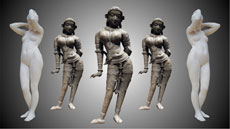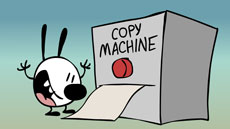Minute Memes: Reframing Copyright One Idea At a Time
Minute Memes are supported by a generous grant from the Andy Warhol Foundation for the Visual Arts and donations from supporters like you. We’re planning on making many more memes and anything you can give will help; so if you like the Minute Memes project, please consider making a directed donation.
What are the Minute Memes?
The Minute Memes project is a series of one-minute videos about copyright restrictions and artistic freedom, made by award-winning animator Nina Paley.
.jpg) |
 |
 |
 |
| Copying Is Not Theft | All Creative Work Is Derivative | EFF Tribute | Credit Is Due: The Attribution Song |
The series counteracts widely-available videos from the recording and publishing industries that seek to frame copyright as natural property right. The Minute Memes build a new frame of reference to supplant received rhetoric about copyright — such as:
- the notion of “balancing” the needs of creators and the public, which assumes that the two are in opposition;
- the idea that copying is a form of stealing; and
- the idea that control of copying must be bound up with questions of attribution.
The Minute Memes use visual storytelling, music, lyrics, and high production values to show how art, artists, and audiences can thrive in a permissive and non-monopolistic environment. Several have been completed and are already widely shared on the Internet. Please consider donating to this project to support the production of more Minute Memes.
Motivation: Why Minute Memes?
Due largely to ubiquitous, professionally-made public campaigns by the recording and publishing industries, many people — even those who share music online — identify unauthorized copying with stealing and with plagiarism. Before a new way of thinking can be presented, then, the issues must be reframed. We must enable the viewer to feel that formerly unquestioned terms and assumptions deserve a fresh look. Only after crossing that emotional barrier will someone be willing to consider copyright in a new way. But crossing that kind of barrier requires rhetorical tools that go beyond plain expository argument. For someone to consider ideas they may have previously felt were unrealistic or even immoral, they need to first give themselves permission — they must feel it’s safe to go there.
Donate:
To donate to the Minute Memes Project, please use our regular donations page. If you choose the PayPal option, remember to write “Minute Memes” in the notes field.


Only just found this post. It sounds fantastic to me.
Particularly the first two I could see spreading incredibly well (as so many people are so fed up with the monopolists’ framing, but aren’t sure how to think things through further).
Not sure I like the idea of using actors to do a fake strangers on the street section. Seems contrived and like it would annoy people. Perhaps just short clips of people in the street interviewed, saying something along the industry lines, and then pausing to explain (in a very fact – maybe even statistic – centric way) why this isn’t how things actually work.
Perhaps it would make sense for Creative Commons to help fund this? What are your plans re: funding? Donations can certainly play a role, but are you looking at other grants / similar? Glad to see you’re planning to apply for the Warhol grant.
– njw
Thanks for reading over these!
We’re applying for grants, yup (one application in so far, and we plan to have the Warhol app in before September 1st). But we can *always* use help with grant applications. Grantwriting turns out to be incredibly time consuming. I had no idea until I started doing it, whew :-).
We talk to Creative Commons about a lot of stuff, and (I hope) may be able to work with them on the Creator-Endorsed Mark. This sort of ground-up reframing isn’t what they’re about, generally, but there is some overlap. They’re very much about broadening the choice of licenses artists have and getting artists to see the benefits of loosening restrictions (yay); they’re not so much about reframing the entire rhetoric of “choice” as opposed to “restriction”, etc.
Look, what I’m suggesting is something like your first MM, CINT, only with maybe 6 mice this time, and they start out different iconic critters and then borrow body parts as before but don’t end up looking like the Red Army marching through Red Square (like the current one does, at the end), and instead you have one with a mustache, one with big hair, one that looks like Rembrandt, a Mona Lisa, a Dali, a Picasso cubist, whatever (I think you can do this without paying for the rights to cartoonize, right??) and they mix and match, like a mustache on the Mona Lisa mouse. So that in the end they are ALL richer and different still.
And you could have one guy who is a constant character throughout all the MMs, who represents the content CREATOR, who is creating his stuff off to the side, and people can identify with him, he could become the mascot of MMs. But I think the idea of uniformity is not so good, strikes the wrong nerve somehow. Somehow, we have to get the idea of copying a-la “candles” spreading light — it’s subtle and yet anyone can understand that more light is better and actually we all benefit if we can each contribute a little bit. And duh, if it’s illegal to spread the light, then we’re all in the dark, which also perfectly illustrates the Moguls M.O. — and hey, maybe the mascot could be a candle[1]. That hints at “light bulb” going on, at Prometheus, and enlightenment…
–Robert
[1] beware infringement on “Lumiere” in Disney’s rendition of the French fable “Beauty and the Beast”.
Regarding Nina’s comments in her recent “Command Line” interview about not receiving “muse guidance” on “Copying Is Not Plagiarism” and also “The Problem is Monopolies (Not Commerce)” and the idea that the memes might not all get funded…
You might want to approach this from the direction of what you feel inspired about first, rather than what you think is “most important”. Someone else may feel inspiration about the ones that don’t work for you.
It’s possible that they may want to step up to the plate on some of the memes.
I had originally imagined that Question Copyright was going to have an open call for Minute Memes and that Nina was just going to do some of them. That’s still a possible model you might want to consider — maybe you don’t have to do them in strict order of “social importance”. (This seemed natural to me, because it’s the “community-based” approach, which is what I’m used to).
Personally, I would _love_ to see something that clears the mystery over what “NonCommercial” really means (because I personally find that is one of the biggest challenges). I’ve felt for some time that “NC” was deceptively misnamed — since the only time it makes sense if you want to sell copies of your work commercially (i.e. in the old/proprietary model). Perhaps “Commercial Monopoly” or “CM” would’ve made more sense? 🙂
(Nina mentioned this as a possible meme in her interview and I think it’s a good one. Or at least that we need some meme that addresses the myths around “non-commercial” licenses — I don’t see it here, though, so it’s new).
Well, I think most of the public doesn’t know about the non-commercial licenses — it’s inside baseball, really.
Our goal is just to see to it that the Minute Memes get produced, and are high quality. Hence working with Nina Paley! Of course, if someone has a great meme, neither Nina nor QCO would object — we’d happily use it. But we don’t want to count on crowdsourcing in this case — you’ve got to have someone who really cares about the issue and has the skills to do it right. The intersection of those two sets is not large.
Nina is approaching them in order of inspiration, it turns out. We just change the series order after the fact to reflect whatever order she does them in :-).
I like the idea of using actors to do a fake strangers on the street section. Seems contrived and like it would annoy people. Perhaps just short clips of people in the street interviewed, saying something along the industry lines. Thank you.
Kinda like what Jay Leno does when he goes “Jay-walking”? 😀
-Rich @ FBIhow
when’s the next video coming out? i saw the three that are currently there and they are excellent
looking forward seeing what the adaptions of ‘How Artists Really Make Their Livings’, ‘What Rights Clearance Actually Looks Like’, ‘”You do what you want with your copies, I do what I want with mine.”‘, ‘Audiences Are Active — Culture Is Something We Do Together’ and ‘Copying Is Not Fraud’ will be like.
i just cant wait to have those at my disposal to link in game modding communities and art websites where this topic is ripe with myths and corporate brainwashing and “permission culture” is king
On the off chance of throwing grist into Nina’s mill…
I wonder if “copying is not fraud” as described is covering too much ground. I could imagine a one-minute cartoon of what conflating the two would really look like; say, someone uses a public domain work and everyone knows it but gives them credit anyway (they become valedictorian, Nobel laureate or something) because hey, plagiarism=copyright infringement and there’s no copyright! I think such an approach could really expose the underlying absurdity.
I had also wondered, related to censorship, about a mashup of Murnau’s Nosferatu, remixing the images with new intertitles to tell the story of how the film was nearly destroyed by the Stoker estate. Public domain cuts of the movie might not be of good enough quality, tho.
I like the idea of using actors to do a fake strangers on the street section. Seems contrived and like it would annoy people. Perhaps just short clips of people in the street interviewed, saying something along the industry lines. Thank you.